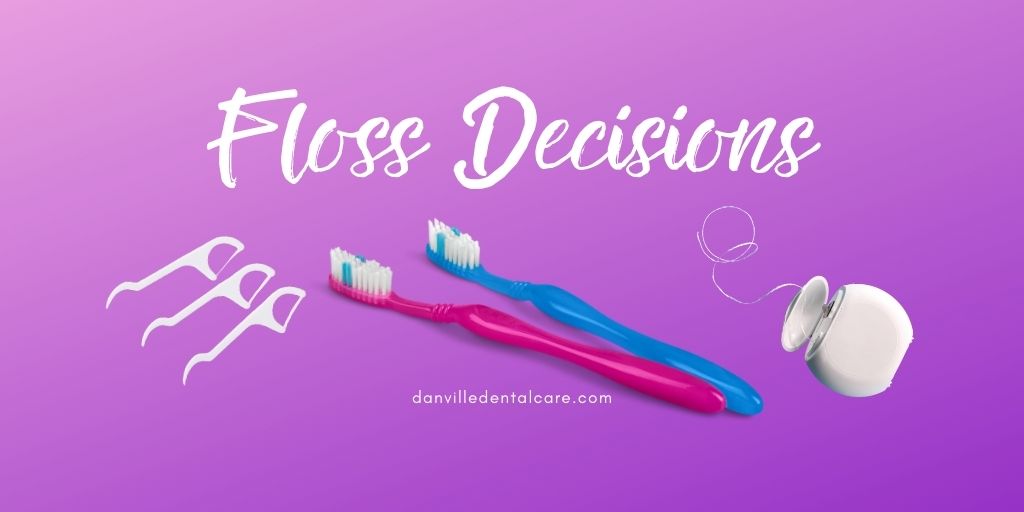We’re sure you’ve heard a million times how important it is to floss every day. That’s because it’s true! Good flossing habits keep your breath smelling fresh, prevents tooth decay, and helps you avoid gum disease. With so many products on the market, it can be hard and even overwhelming to choose the right floss.
Floss is specially made to fit inside and slide through the tight spaces between your teeth. It gets out any of the gunk that toothbrushing or mouthwash leaves behind. When you don’t floss every day, small food particles and other debris collect in between teeth. Eventually, bacteria shows up to the party, and you’ll likely begin to have chronic bad breath. If the bacteria grows, your tooth enamel will erode, you may experience inflammation, and it could even lead to gum disease.
Needless to say, flossing is extremely important. Read on to learn about all of your options.
Avoid These Bad Habits
According to a survey the American Dental Association (ADA) conducted in 2017, most American adults admitted to using other objects to floss their teeth. Imagine a popcorn kernel getting stuck between your molar during a movie. Do you reach in your pocket and pull out a pack of floss? Probably not. In fact, check out these survey results.
Out of 1,005 adults, the ADA discovered that:
- 61 percent use fingernails
- 40 percent use rigid pieces of paper or cardstock
- 21 percent use cutlery like forks or knives
- 14 percent use safety pins
- 7 percent use strands of hair
Another ADA survey found that patients have also used:
- Twigs
- Matchbooks
- Toenails
- Screwdrivers
- Pocket knives
- Loose electrical wires
Yikes! Sound dangerous? That’s because it is. Not only are these objects unsanitary, but they can also injure your teeth, tongue, gums, or lips. This is why floss is so vital to your oral health. So, if you do happen to get something stuck between your teeth, try waiting until you can use floss to remove it. It’s a product that’s made with your oral health and safety in mind.
Choose the Right Floss
There are two kinds of floss to choose from:
- Multifilament and
- Monofilament
Multifilament floss is made of nylon or silk. It’s the most common and has been on drugstore shelves the longest. It’s typically the cheaper kind of floss, and it’s what you’ll get when you purchase a generic brand. Multifilament floss comes waxed or unwaxed and in a variety of flavors, including unflavored.
Waxed floss helps it slide through the teeth more comfortably. It may feel gentler to some. This kind of nylon floss also comes in many different thicknesses, so it might take you a little time to figure out what feels most comfortable for you.
Monofilament floss is a newer dental product. It’s not made of nylon or any other fabric, so it doesn’t tear or rip. In fact, this more modern floss is made from different kinds of rubber or plastic. Basically, this means it’s made of really strong material, which many patients prefer, citing that it’s easier to glide between their teeth.
This kind of floss also comes in lots of different flavors and thicknesses, so there are a lot of products to test out and see what you like best. Monofilament floss doesn’t come in waxed or unwaxed because it doesn’t need to. It’s already very smooth.
So, What Kind of Floss Should You Use?
Any kind you want! All floss is either multi- or monofilament, and neither type works better than the other. It’s all about what you prefer. Any floss you turn into a habit is a good floss. If it’s a product that you enjoy using or at least don’t hate using every day, you’re more likely to create and sustain a good dental habit. Always make sure the floss you choose has the ADA Seal of Acceptance on the packaging.
Want some more advice on flossing, or is it time for a checkup? Make an appointment by calling us today at 317-745-4400.
Are you on Facebook? We are, too! Let’s be friends!
Disclaimer: The information included in this article is for educational purposes only. It should not be used as a substitute for professional medical advice, diagnosis or treatment.


 (317) 745-4400
(317) 745-4400
